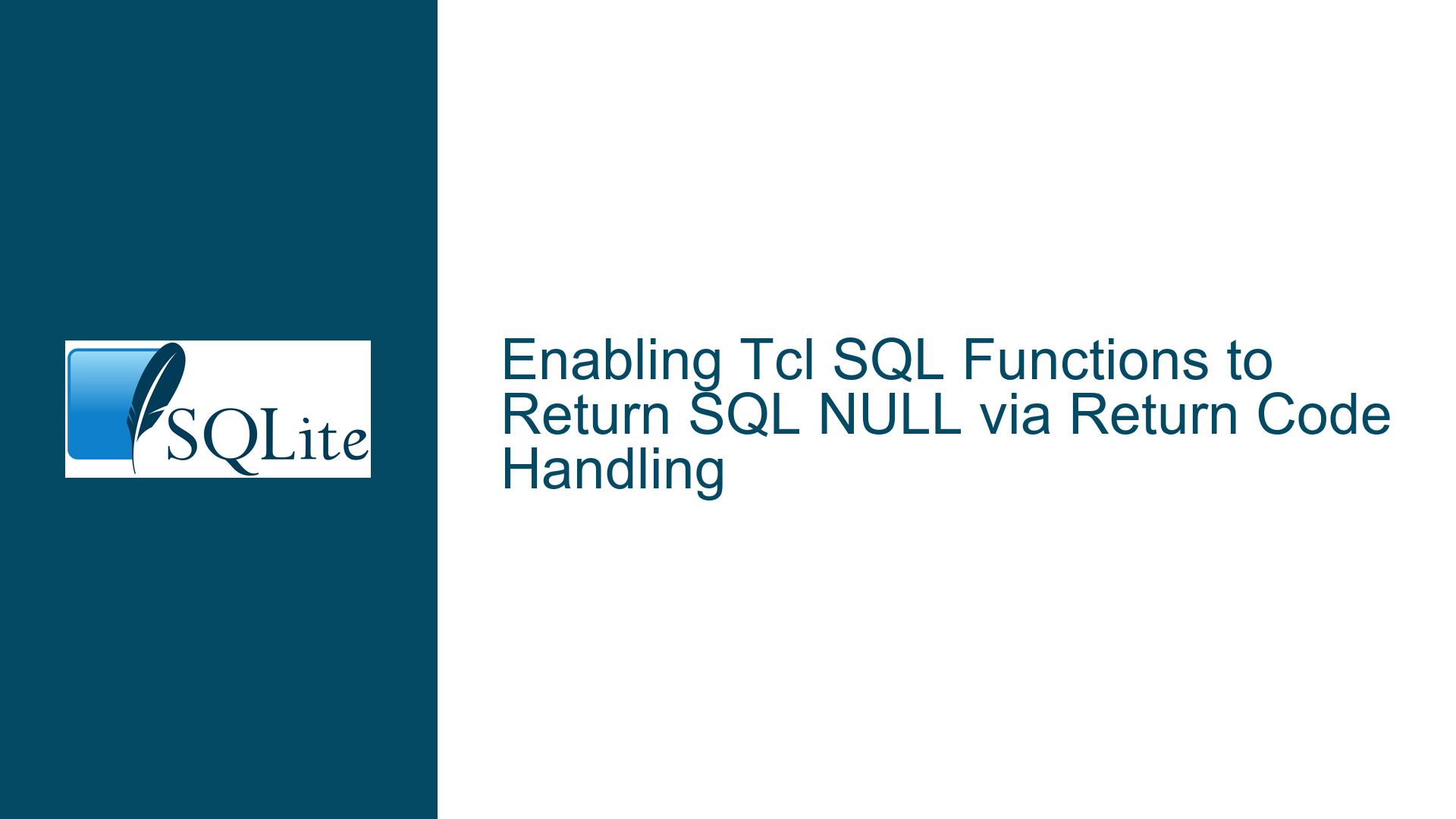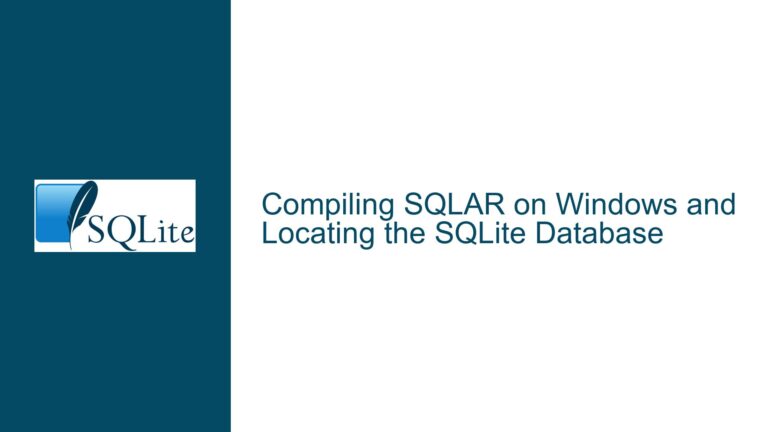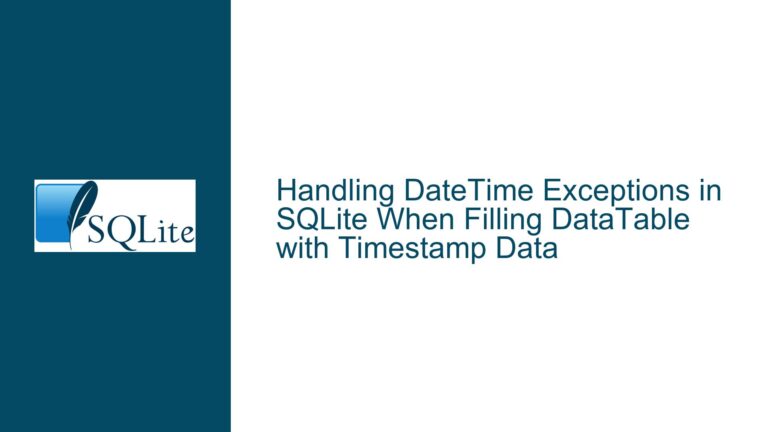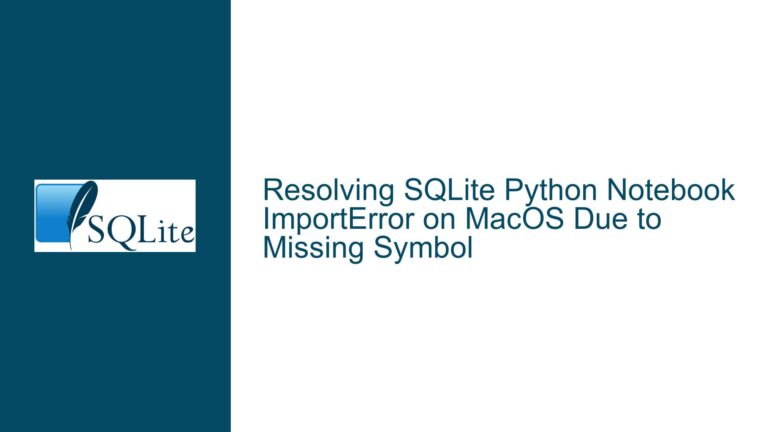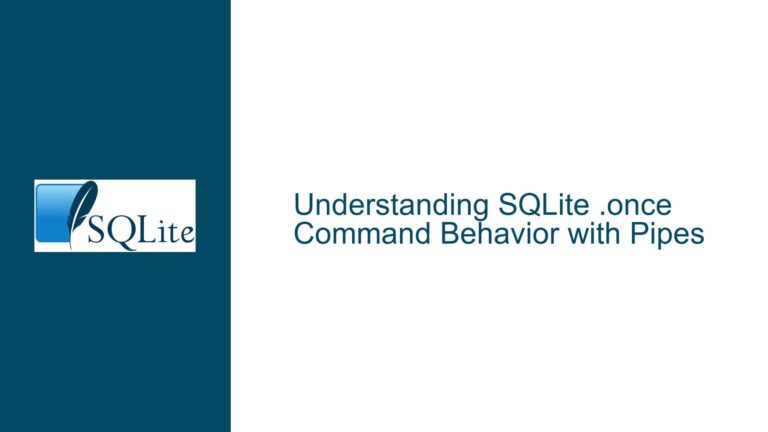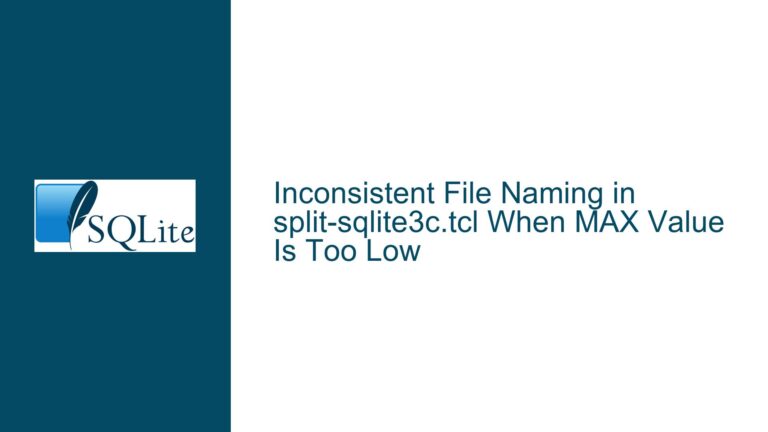Enabling Tcl SQL Functions to Return SQL NULL via Return Code Handling
Tcl Interface Limitations in Signaling SQL NULL from Custom Functions
The SQLite Tcl interface provides a mechanism for defining custom SQL functions in Tcl, allowing developers to extend SQLite’s capabilities with Tcl scripting logic. However, a critical limitation arises when attempting to return SQL NULL values from these Tcl-implemented functions. The Tcl language does not natively represent SQL NULL as a distinct value, leading to ambiguity in translating Tcl function results into SQL-compatible types. This creates challenges for developers requiring precise control over SQL result sets, particularly when NULL semantics are essential for query correctness, such as in conditional expressions (IS NULL, IS NOT NULL), aggregate functions, or JOIN operations.
The proposed solution involves leveraging Tcl’s return -code break mechanism to signal the SQLite Tcl interface to produce an SQL NULL instead of interpreting the result as a non-NULL value. This approach requires modifications to the SQLite Tcl interface source code (tclsqlite3.c) to detect the TCL_BREAK return code and invoke sqlite3_result_null() instead of defaulting to error reporting or value conversion. The discussion highlights the need for a clear signaling mechanism between Tcl and SQLite’s type system while respecting Tcl’s value semantics, where NULL is not a first-class citizen but an absence of value.
Tcl-SQLite Type System Mismatch and Control Flow Ambiguity
The inability of Tcl-implemented SQL functions to return SQL NULL stems from fundamental differences in how Tcl and SQLite handle typed values and nullability. Tcl treats all variables as strings that can be interpreted as other types (e.g., integers, lists) contextually, but it lacks a built-in NULL type. SQLite, however, requires strict type affinity and explicit NULL handling. When a Tcl function returns an empty string, SQLite interprets this as a zero-length text value, not as NULL. This mismatch leads to incorrect query results when NULL is semantically required.
A deeper issue lies in the SQLite Tcl interface’s error handling and result processing logic. The current implementation in tclsqlite3.c maps Tcl function results to SQLite values using Tcl_GetObjResult(), which captures the Tcl interpreter’s result as a string or other typed object. Errors in Tcl functions (e.g., exceptions, runtime errors) are propagated as SQLite errors via sqlite3_result_error(). However, there is no designated pathway for Tcl functions to explicitly signal that the SQL result should be NULL, as opposed to an error or a non-NULL value. This creates ambiguity in control flow: developers cannot distinguish between a function intentionally returning NULL versus encountering an error or returning an empty string.
The proposed patch modifies the result processing logic to intercept the TCL_BREAK return code, which is conventionally used in Tcl for loop control (e.g., breaking out of loops). By repurposing this return code, the patch introduces a side channel for signaling NULL without conflicting with Tcl’s existing error handling mechanisms. However, this approach raises questions about the broader implications of overloading Tcl’s control flow mechanisms for data representation purposes. For instance, could using TCL_BREAK inadvertently interfere with loop constructs or exception handling within Tcl functions? The discussion suggests that such conflicts are unlikely, as return -code break is rarely used in typical Tcl function implementations, making it a viable candidate for signaling NULL.
Implementing and Validating TCL_BREAK as a NULL Signaling Mechanism
To resolve the NULL signaling issue, developers must modify the SQLite Tcl interface’s result processing logic and validate the behavior under various scenarios. The following steps outline the implementation, testing, and mitigation strategies:
Code Modification in
tclsqlite3.c:- Locate the function responsible for processing Tcl function results (typically
tclFunction()or similar). - Adjust the return code handling logic to check for
rc == TCL_BREAKbefore evaluating other error conditions. - Invoke
sqlite3_result_null(context)when TCL_BREAK is detected, bypassing the default error handling and value conversion. - Ensure that other return codes (e.g., TCL_OK, TCL_ERROR) continue to trigger the appropriate SQLite responses (e.g., value conversion, error propagation).
Example modification:
if (rc == TCL_BREAK) { sqlite3_result_null(context); } else if (rc != TCL_OK && rc != TCL_RETURN) { sqlite3_result_error(context, Tcl_GetStringResult(interp), -1); } else { Tcl_Obj *resultObj = Tcl_GetObjResult(interp); // Convert resultObj to SQLite value... }- Locate the function responsible for processing Tcl function results (typically
Testing for Control Flow Integrity:
- Verify that Tcl functions using
return -code breakcorrectly produce NULL in SQLite. - Ensure that nested Tcl procedures or functions using
breakfor loop control do not inadvertently trigger NULL results. - Test edge cases, such as functions returning empty strings, integers, or lists, to confirm they are not misclassified as NULL.
- Validate error handling: Functions returning TCL_ERROR should still propagate errors to SQLite.
- Verify that Tcl functions using
Documentation and Developer Guidance:
- Update SQLite Tcl interface documentation to specify that
return -code breakis reserved for signaling SQL NULL. - Provide examples of Tcl functions returning NULL and contrast them with functions returning empty strings or errors.
- Warn against misuse of
return -code breakoutside of NULL signaling to prevent unintended control flow disruptions.
- Update SQLite Tcl interface documentation to specify that
Alternative Signaling Mechanisms (Fallback Strategies):
- If overloading TCL_BREAK proves problematic, consider alternative approaches such as:
- Special Value Conventions: Reserve a specific string (e.g.,
__SQL_NULL__) to represent NULL, requiring developers to return this string and modifying the Tcl interface to detect and convert it. - Named Parameters: Introduce a new Tcl command (e.g.,
sqlite_return_null) that directly invokessqlite3_result_null()within the function context.
- Special Value Conventions: Reserve a specific string (e.g.,
- Evaluate performance and compatibility trade-offs of each alternative, ensuring minimal overhead and maximal backward compatibility.
- If overloading TCL_BREAK proves problematic, consider alternative approaches such as:
By systematically addressing the type system mismatch, refining control flow handling, and validating the solution through rigorous testing, developers can enable robust NULL signaling in SQLite Tcl functions while preserving the integrity of existing Tcl and SQLite semantics.
